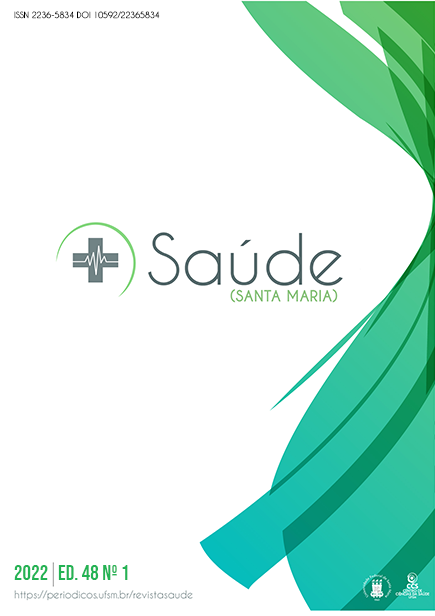Reaproveitamento de medicamentos para COVID-19: uma visão geral
DOI:
https://doi.org/10.5902/2236583467893Keywords:
Reposicionamento de medicamentos. Redirecionamento de medicamentos. SARS-CoV-2. Coronavírus.Abstract
The SARS-CoV-2 virus can cause infections in both animals and humans. COVID-19 is an infectious disease caused by this virus and known today for generating great concern worldwide, as it has high rates of transmissibility and pathogenicity and high death rates known worldwide as a result of this infection. For this reason, potential therapeutic strategies are analyzed to contribute to the fight against the COVID-19 pandemic. Some of these therapeutic strategies are carried out through the repositioning of medications. For this opinion study, scientific articles were used, which discussed the repositioning of drugs in COVID-19 and the use of vitamins and minerals in the treatment. It can be seen that the reuse of drugs has several advantages over the implementation of a new drug, such as reduced time to start treatment and reduced financial investment, which leads to a delay in the arrival of purchased drugs and products, especially during this period. pandemic. This drug replacement, with its immediate administration to the patient, ends up causing a delay in the development of the disease course, as well as a lower risk of treatment failure. So far, there is no regularized, standardized and widely publicized therapeutic resource available to the population, however, further studies on this topic should necessarily be encouraged.
Downloads
References
Chen N, Zhou M, Dong X, et al. Epidemiological and clinical characteristics of 99 cases of 2019 novel coronavirus pneumonia in Wuhan, China: a descriptive study. Lancet. 2020;395:507–513.
Lu H, Stratton CW, Tang YW. Outbreak of pneumonia of unknown etiology in wuhan China: themysteryandthemiracle. J Med Virol. 2020;92(4):401–402.
Yin Y, Wunderink RG. MERS, SARS andothercoronaviruses as causes of pneumonia. Respirology. 2018;23(2):130-137.
Hamid S, Mir MY, Rohela GK. Novel coronavirusdisease (COVID-19): a pandemic (epidemiology, pathogenesis and potential therapeutics). New Microbes New Infect. 2020;14(35):100679.
Huang C, Wang Y, Li X, et al. Clinical features of patients infected with 2019 novel coronavirus in Wuhan, China. Lancet. 2020;395(10223):497–506.
Phan LT, Nguyen TV, Luong QC, et al. Importation and human-to-human transmission of a novel coronavirus in Vietnam. N. Engl. J. Med. 2020;382:872-874.
Serafin MB, Bottega A, Foletto VS, et al. Drug repositioning is na alternative for the treatment of coronavirus COVID-19. Int J AntimicrobAgents. 2020;55(6):105969.
Ashburn TT, Thor KB. Drug repositioning: identifying and devel¬oping new uses for existingdrugs. Nat Rev Drug Discov. 2004;3(8): 673-83.
Cha Y, Erez T, Reynolds IJ, et al. Drug repurposing from the perspective of pharmaceutical compa¬nies. Br J Pharmacol. 2018;175(2):168-80.
Pushpakom S, Iorio F, Eyers PA, et al. Drug repurposing: progress, challenges and recommendations. Nat Rev Drug Discov. 2019;18(1):41-58.
RECOVERY Collaborative Group et al. Dexamethasone in hospitalized patients with Covid-19 - preliminary report. N. Engl. J. Med., 2020.
Kupferschmidt K, Cohen J. Race to find Covid-19 treatments accelerates. Science. 2020;367(6485):1412-1413.
Martins MCC, Oliveira ASSS. ZINCO, VITAMINA D E SISTEMA IMUNE: PAPEL NA INFECÇÃO PELO NOVO CORONAVÍRUS. Revista da Faesf. 2020;4:16-27.
Stroylov VS, Svitankoa IV. Computational identification of disulfiram and neratinib as putative SARS-CoV-2 main protease inhibitors. Mendeleev. Commun. 2020; 30:419–420.
Touret F, Gilles M, Barral K et al. In vitro screening of a FDA approved chemical library reveals potential inhibitors of SARS-CoV-2 replication. Sci. Rep. 2020;10:13093.
Elmezayen AD, Al-Obaidi A, Şahin AT, et al. Drug repurposing for coronavirus (COVID-19): in silico screening of known drugs against coronavirus 3CL hydrolase and protease enzymes. J Biomol. Struct. Dyn. 2021;39(8):2980-2992.






